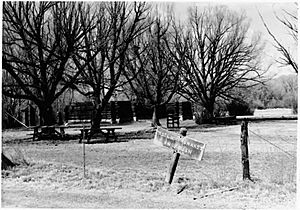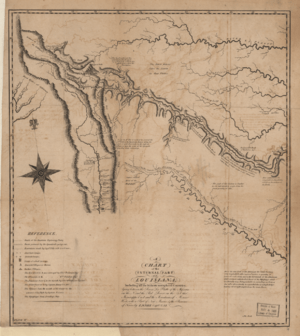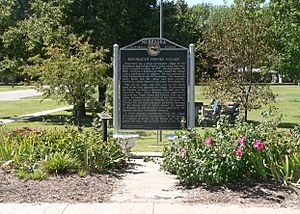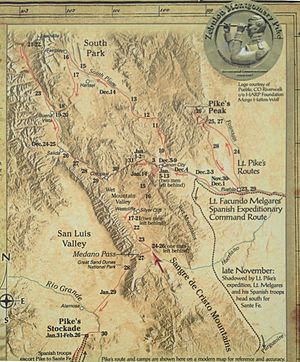Pike Expedition facts for kids
The Pike Expedition was a journey led by United States Army Lieutenant Zebulon Pike. It took place from July 15, 1806, to July 1, 1807. President Thomas Jefferson sent this military group to explore the southern and western parts of the Louisiana Purchase. This was a huge area of land the United States had recently bought.
The expedition happened around the same time as the famous Lewis and Clark Expedition. Pike's journey was the first official American effort to explore the western Great Plains and the Rocky Mountains in what is now Colorado. During his travels, Pike met several Native American tribes. He told them that the United States now claimed their land.
The expedition also officially recorded the discovery of a mountain called Tava. This mountain was later renamed Pikes Peak to honor Pike. After some time, Pike divided his group. He led the larger part to find where the Red River began. A smaller group returned safely to the US Army fort in St. Louis, Missouri before winter.
Pike's group made some mistakes and ended up in Spanish territory. This area is now southern Colorado. The Americans built a fort there to survive the winter. In February, the Spanish captured Pike and his men. They were taken into Mexico. Their journey through what is now New Mexico, Mexico, and Texas gave Pike important information. He learned about the Spanish military and their towns.
Pike and most of his men were released because the United States and Spain were not at war. However, some of his soldiers were kept in Mexican prisons for years, even though the US protested. In 1810, Pike wrote a book about his expeditions. It was very popular and was translated into French, German, and Dutch for people in Europe to read.
Why Did Pike Explore?
On June 24, 1806, General James Wilkinson gave Lieutenant Zebulon Pike, who was 27, an important order. Pike was to lead an expedition to the western and southern parts of the Louisiana Purchase. His goals were to map the land, meet Native American peoples, and find the source of the Red River.
Pike started his journey on July 15 from Fort Belle Fontaine near St. Louis, Missouri. He had 20 soldiers with him. He also had 50 Osage people who were being returned to their homes. The expedition followed the Missouri River and the Osage River. They reached an Osage Nation village near the border of present-day Kansas and Missouri. On August 15, Pike returned the Osage people and talked with the Native Americans.
The group then headed northwest toward the Pawnee territory. This was on the Republican River in southern Nebraska. On September 29, Pike met with the Pawnee leaders at their village, known as the Pike-Pawnee Village Site. He told them that the United States now claimed to protect their land. He also asked the Pawnee to take down a Spanish flag from their village and fly the American flag instead.
The expedition then turned south and traveled across the prairie to the Arkansas River. They reached it on October 14. At this point, the group split into two. One group was led by Lieutenant James Biddle Wilkinson, the General's son. They traveled downstream along the Arkansas River. They then went up the Mississippi River and safely returned to St. Louis.
Pike led the other, larger group upstream, heading west. They were going toward where the Arkansas River began. As they crossed the Great Plains, Pike wrote about the vast, sandy areas. He said they might become as famous as the deserts of Africa. He saw places where the wind had piled up sand like ocean waves, with no plants growing. Later, in 1820, when Stephen Harriman Long explored this area, he called it the "Great American Desert" on his map.
Pike's Journey in Colorado
On November 15, Pike saw a distant mountain for the first time. He called it "Grand Peak." This mountain was Tava, and it was later named Pikes Peak in his honor. Pike tried to climb the peak. He hoped to see the area around it to help him make maps. The summit is about 14,000 feet high. Pike's group climbed a smaller mountain nearby, likely Mount Miller. This mountain was named after Theodore Miller, one of Pike's soldiers.
As winter approached, Pike continued up the Arkansas River. On December 7, the group reached Royal Gorge. This is a stunning canyon on the Arkansas River at the base of the Rocky Mountains.
Pike's next plan was to travel to the source of the Red River. Then he would go downstream to the Mississippi River and reach safer, lower lands. But his group got lost. They made several mistakes trying to find the river. They were not ready for a mountain expedition or for harsh winter weather. Heading north, the group found the South Fork of the Platte River. They followed it upstream, thinking it was the Red River's source. Then they turned back downstream. They returned to the same spot where they had left the Arkansas River earlier. They had traveled in a big circle, wasting weeks of valuable time.
The group was hungry, cold, and very tired. They headed south over the mountains. Several men were left behind because they were too exhausted to continue. But Pike kept pushing forward. By January 30, he and the ten men still with him reached the Rio Grande. This was near Alamosa in what is now southern Colorado. At that time, it was part of the Spanish empire. Pike thought the Rio Grande was the Red River he had been looking for. Here, he built a fort. He tried to gather the rest of his men, who were spread out across miles of mountains behind him.
Pike's Capture

On February 26, Pike and his remaining men were captured at their fort. Spanish soldiers from nearby Santa Fe arrested them. The Spanish believed the group were spies. They gathered the rest of Pike's men who were still in the mountains. Then, they marched everyone south. The Spanish took them through Santa Fe, Albuquerque, and El Paso. Their journey ended in Los Coabos, the capital of Chihuahua. Along the way, Pike's group was treated with respect. The Mexican locals celebrated them. Pike carefully wrote down notes about the Spanish military strength and the number of people living in the towns.
Chihuahua's Governor Salcedo released Pike and most of his men. They were military officers from a neighboring country, and Spain was not at war with the United States. The Governor ordered Pike to be sent back home. However, some of Pike's soldiers were kept in jail in Mexico for years. The Spanish military escorted Pike and some of his group back north. They traveled through San Antonio, Texas. They arrived at the border with Louisiana at Natchitoches on July 1, 1807.
The Spanish government officially complained to the United States Department of State. They were upset about the military expedition being in their territory. But the US government said that the group was only exploring. Pike's capture by the Spanish and his travels through New Mexico, northern Mexico, and Texas gave him more information about Spanish power than his expedition alone could have.
See also
 In Spanish: Expedición de Pike para niños
In Spanish: Expedición de Pike para niños
 | Emma Amos |
 | Edward Mitchell Bannister |
 | Larry D. Alexander |
 | Ernie Barnes |




